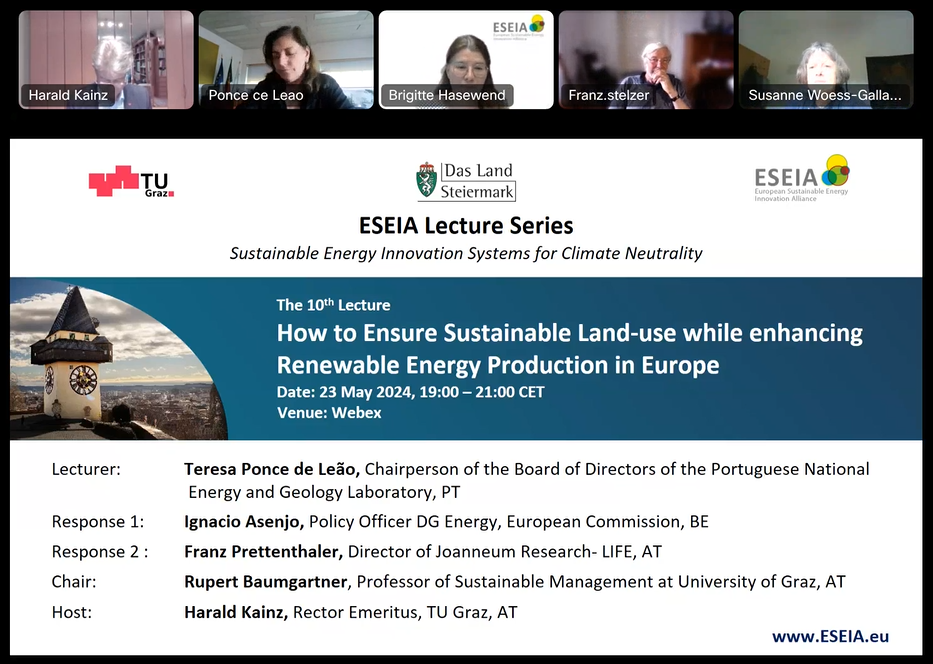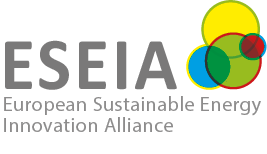ESEIA Lecture Series: Tenth Lecture Explores Renewable Energy and Land Use in Europe
The tenth lecture in the ESEIA Lecture Series took place on 23 May 2024, welcoming 26 attendees from seven countries to explore sustainable land use and enhanced renewable energy production in Europe.
Titled How to Ensure Sustainable Land-use while enhancing Renewable Energy Production in Europe, the tenth lecture was held online from 19:00 to 21:00 CEST, featuring the Chairperson of the Board of Directors of the Portuguese National Laboratory of Energy and Geology (LNEG) and ESEIA Vice-President Teresa Ponce de Leão as a guest lecturer. This lecture, organised by ESEIA in cooperation with Graz University of Technology (TU Graz) and supported by the Styrian Government, is part of the hybrid series Sustainable Energy Innovation Systems for Climate Neutrality initiated in 2022 that has been providing a platform for perspectives exchange between different stakeholders on the necessary actions to achieve climate neutrality by 2050.
After the welcome statements delivered by the Rector Emeritus of TU Graz and Honorary President of ESEIA Harald Kainz and the ESEIA Director Brigitte Hasewend, the Professor of Sustainable Management at the University of Graz Rupert Baumgartner opened up the session by introducing the topic and the panel of speakers. The line-up included experts from different fields who touched upon various topics, from EU policymaking and renewable energy potential to climate change adaptation in agriculture and solar energy deployment:
- Teresa Ponce de Leão, Chairperson of the Board of Directors of LNEG and ESEIA Vice-President;
- Ignacio Asenjo, Policy Officer, DG Energy, European Commission;
- Franz Prettenthaler, Director of Joanneum Research-LIFE.
Teresa Ponce de Leão started her presentation by introducing LNEG, a State laboratory of the Portuguese Ministry of Environment and Energy Transition that performs R&D in Energy, Geology and Geological Resources, outlining its role in promoting technological innovation for greater competitiveness of the Portuguese economy. After describing LNEG’s research units and activities, including public policy support and international partnerships, she offered an overview of the EU policy landscape to accelerate the deployment of renewable energy. One of the proposals mentioned during her presentation was the Net Zero Industry Act, which is part of the Green Deal and aims to scale up clean technology production in the EU.
Another focal point of her presentation was the introduction of two comprehensive studies conducted by LNEG for mapping the best areas for locating green hydrogen production plants (National Sustainable Green H2 Atlas) and identifying the technical potential of renewable energy in Portugal (Estimation of the Technical Potentials of Renewables for Mainland Portugal). She also noted that while switching to renewable energy could propel the decarbonisation of the supply chain, it may raise land-use conflicts. According to another work carried out by LNEG in cooperation with the Portuguese Environment Agency and other entities, 4% of the area of mainland Portugal is available for installing renewable electricity projects without compromising environmental or territorial values.
She concluded her presentation by stressing the importance of environmentally sustainable business activities and briefly mentioning the role of new technologies, particularly geo-engineering (Solar Radiation Management and Greenhouse Gas Removal), to mitigate the impacts of climate change.
Then, Ignacio Asenjo took the opportunity to discuss the Renewable Energy Directive and its latest revision, raising the 2030 target for the share of renewable energy in the EU’s overall energy consumption from 32% to 42.5%. A key measure introduced by the revised Directive is the thorough mapping and spatial planning for renewable energy projects in the Member States to promote multiple land uses. He also highlighted the importance of solar rooftops as a crucial element in the energy strategy and explained that the recently revised Energy Performance of Buildings Directive foresees solar installations (solar thermal, PV or the combination of both) on buildings across the EU. He concluded with a note on innovative forms of solar energy deployment, such as Agri-PV, facing regulatory barriers with dual land or water use in many Member States and the European Commission’s commitment to addressing these to accelerate the deployment of renewable energy.
Following Ignacio Asenjo’s presentation, Franz Prettenthaler offered a glimpse into how climate change forces more food production into protected cultivation, which increases electricity consumption in agriculture, providing examples of the impact of the late spring frost on apple and wine production in Styria. He then explained how Agri-PV to produce crops and generate energy could be used to tackle this issue and reinforced the importance of green roofs to support food production and enhance sustainability in cities. Then, he presented the Rooftop Farming project of the Science Tower as an example of the benefits of embracing Agri-PV and investing in Nature-based Solutions, paving the way for a greener future.
The session concluded with an engaging discussion between the speakers and the attendees on other related topics, namely public perceptions of renewable energy technologies, the state of the renewable energy industry in the EU, demand for green skills or other obstacles to accelerating the energy transition.
Thank you to the speakers, the participants, the chair Rupert Baumgartner, the host Harald Kainz, and all those who have contributed to the success of this event. We look forward to seeing you again soon!

Upcoming lecture: Circular Bioeconomy Start-up Villages: From Idea to Market
The ESEIA Lecture Series will return on 24 October 2024 with the guest lecture titled Circular Bioeconomy Start-up Villages: From Idea to Market, delivered by Evelyn Reinmuth, University of Hohenheim, DE. This lecture will introduce circular bioeconomy start-up villages, outlining the strategy from the idea to market, and present two case-study villages from Cyprus and Lithuania. During the lecture, we will also cover the start-up concept in the village, place-based approach to problem-solving, existing initiatives and transformative resilience, emphasizing the use of local resources to create new opportunities.
The lecture is free and open to all interested stakeholders. Get to know the speakers and register here to attend!
More information about the ESEIA Lecture Series Sustainable Energy Innovation Systems for Climate Neutrality is available here.
Contact:
ESEIA Team: office@eseia.eu


